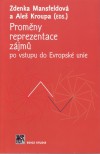The project examines the legal and institutional environment in the Czech Republic, the effect of the most prominent collective actors prior to its accession to the European Union, and changes that are occuring due to the process of Europeanisation. It also explores new challanges resulting from the full integration of the Czech Republic into the EU political and decision-making mechanisms, the creation of mechanisms to influence European and national politics, and the impact of collective actors within a pan-European political arena.
The project also concentrates on analysing the existing institutional structures for interest mediation between individuals, social groups, organizations and the State, and the influence of these structures on the legal system. At the core is interest in the political institutions involved in the process, civil participation, the activities of the most prominent political actors (political parties and interest groups in a wide sense of the world) and the attitudes of these actors toward the studied institutions and each other.
Project publications (total 36, displaying 1 - 10)
Abstract
The article focuses on the change of relationship between the state, state authorities, and local self-governing authorities on the one hand and the Citizen and thein groups on the other hand. It show the new modes of governance which state and self-governing authorities use to communicate with citizen and to invite them to participace on decision-making.
Czech political parties have built their organisations since the beginning of the 1990s in an environment that was hostile to organised partisanship. They face a lack of interest among citizens in joining political parties, which can be seen in the continually falling number of members in the case of KDU-ČSL and KSČM, and in the case of ČSSD and ODS in the stagnation of the number of members since their inception.
The chapter describes third sector and civic participation in the Czech Republic. It focuses on the role of non-governmental organizations, the character of third sector in the Czech Republic and its context in the central European region. It examines the membership of the non-governmental organizations and the third sector as a field of interest articulation. In the last part, it introduces the barriers of the civil sector in the Czech Republic.
The chapter analyse the role of social dialogue and its importance for harmonisation of opposing interests in the field of capital and labour. Social dialogue means different forms of communication between social partners, employers and employees, organisations representing their interests. Attention is paid first of all to the social dialogue on the national level and its institutionalized form, tripartite.
The book gives empirically well-founded study of changes of political and legal framework of the Czech Republic, analysis of existing institutional structures for interest representation. It describes the situation at the moment of joining the European Union and changes which happed after it.
The article explores two main interest groups of local authorities: Asociation of towns and cities and Asociation of regions. It focuses on their relationship towards thein members and on activities dutiny legislative lobbying.
This chapter studies the influence of European integration on political parties, the party system and the electoral behaviour of the Czech citizens. Europeanisation is an external factor that always emerges when something in a domestic political system is influenced by something European; this influence may be direct or indirect.
Chapter evaluates the transformations of Czech organised civil society following accession to the EU. It formulates following conclusions: civil society is shaping the space between private interests and the state in the Czech Republic. The chapter documents the growth in civil participation, both at the macro level and at the micro level. The Czech society has sufficient potential for the participative nature of civil society, and that this potential is starting to be realised.
The article informs of surveys conducted during the project „Forms and Effectivity of Intermediation of Interests between Individuals, social groups and the State.“













Newsletter
Facebook
Twitter